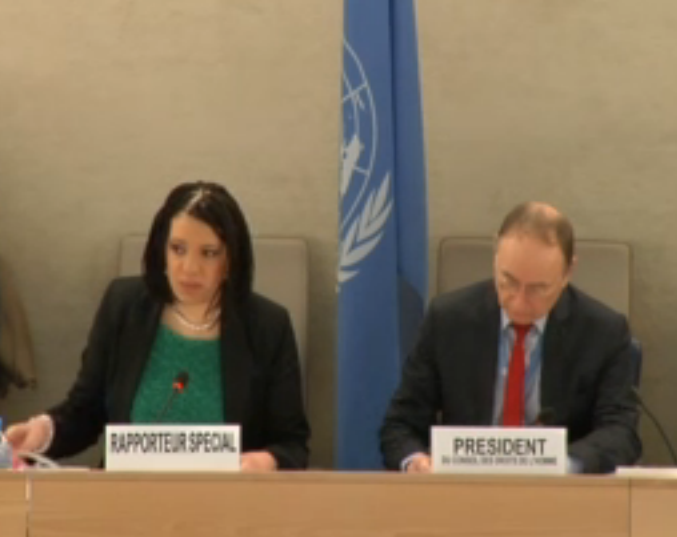Crimea is at the centre of the attention, when it comes to the situation of minorities, due to the systematic violation of linguistic, cultural and religious rights, rights to freedom of association, peaceful assembly and of expression, and personal security, of minorities following occupation and annexation of Crimea by the Russian Federation.
At an event organised by NGOs on 17 March at the United Nations in Geneva, the Head of the Mejilis of the Crimean Tatar People, Refat Chubarov said that his father died a few days before the occupation began: “Stalin had deported him from Crimea. Now, Russia deported me from my land and I am unable to protect my mother facing the death of her husband.” Following his critics against the so-called referendum in Crimea and his call to boycott the consequent Crimean parliamentary election of September 2014, he was labeled “extremist,” and banned from Crimea.
With this personal account as a backdrop, the Special Rapporteur on minority issues, Rita Izsák, on 18 March 2015 presented her report to the Human Rights Council following an official visit to Ukraine in April 2014, at the invitation of the Government. She visited Donetsk, Kyiv, Odesa and Uzhgorod. She consulted with hundreds of stakeholders, including senior government officials from the Ministry of Foreign Affairs and the Ministry of Culture, representatives of civil society and minority communities, religious leaders, political actors, academics, journalists and internally displaced persons (IDPs), the diplomatic community, United Nations bodies and other national and international actors. You can see the presentation here.
In its latest report of February 2015, the Crimean Human Rights Field Mission reports about grave human rights violations against minorities in Crimea, especially Ukrainian minorities and Crimean Tatar people.
The Special Rapporteur clearly states in her report that the whole of Ukraine has a history of harmonious inter-ethnic and interfaith relations and developed as a country with two common languages, Russian and Ukrainian, and other languages, including Crimean Tatar.
Crimean self-defense, a tool for human rights violations
The so-called Crimean Self-Defence group emerged as an illegal armed group late February 2014. This group was later on recognised de lege in the law of 11 June 2014 On People’s Militia, by which the Crimean Self-Defence is subordinated to the head of Crimea, Sergey Aksenov , and the Council of Ministers of Crimea. It was in this law awarded the status of citizen patrol.
The legalisation of the armed group comes along the fact that alleged human rights abuses committed by representatives of the group remain uninvestigated.
As reported at the NGO event of 17 March 2015 by Oleksandra Matviychuk, head of the Centre for Civil Liberties, the Crimean Human Rights Field Mission was able to document crimes committed by the Crimean Self-Defence, including in March 2014 the abduction and murder of Reshat Ametov and the abduction and torture of over 20 Ukrainian activists, among other systematic use of violence against activists, especially pro-Ukrainian and Crimean Tatar activists, journalists and media workers, participants to pro-Ukrainian peaceful assemblies, members of the clergy and religious leaders, NGOs and unions. The Self-Defence group was particularly active in pressuring Crimean residents during the so-called local elections.
Propaganda creating uncertainty and distrust
As stated by the Special Rapporteur, “developments in early 2014 have created an environment of uncertainty and distrust that may create fractures along national, ethnic and linguistic lines and which threaten peaceful coexistence if not quickly resolved.” The Crimean Self-Defence is directly implicated in propagating hate messages against minorities in Crimea and in promoting, supporting and undertaking violence against such minorities.
Since the EuroMaidan indeed , officials of the Russian Federation have repeatedly tried to allege that the Maidan protests have anti-Russian aims and that the authorities elected on 25 May and 26 October 2014 are pursuing policies against minorities.
At the Human Rights Council, HRHF in its statement endorsed by member NGOs of the Human Rights House Kyiv, the Human Rights House Chernihiv and the Human Rights House Voronezh, denounced “the role of propaganda, which tried to make people believe that EuroMaidan related events were anti-Russian and tried to make the world believe that Russian speaking people needed protection in Ukraine.”
Documents:
- HRC 28 – HRHF statement on minorities and Crimea
United Nations reports systematic human rights violations
For the United Nations, the status of the Autonomous Republic of Crimea is guided by General Assembly resolution 68/262 of 27 March 2014.
In its report of February 2015, the United Nations Human Rights Mission in Ukraine states that:
“the situation in the Autonomous Republic of continues to be characterized by systematic human rights violations affecting mostly Crimean Tatars and those who opposed the March ‘referendum.’ The application of Russian Federation laws, which contravene resolution 68/262, also has human rights implications. Arrests and detention of Crimean Tatar activists on charges related to demonstrations and disruption of the activities of their civil society organizations and media outlets on the grounds of prevention of ‘extremist activities’ have been evident. Arrests, prosecution and deportation of Crimean Tatar leaders, including leaders of the Crimean Tatar Mejlis and the Committee on the Protection of the Rights of the Crimean Tatars, have been criticized by Crimean Tatar leaders and those affected as politically motivated.”
Crimean Human Rights Field Mission
The Field Mission in Crimea is jointly run by NGOs from Ukraine and the Russian Federation. It began its work on 5 March 2014, at the initiative of human rights defenders from both countries.
The Mission is currently the only international human rights mission that is constantly working on the territory of Crimea and monitors the situation with human rights on the peninsula.
Related Articles
Crimea: critical situation for human rights
Full accountability is needed in Ukraine
Restoring independence to the process of defending rights and the rule of law in Ukraine
Ukraine: Human rights must be basic principle to end violence





